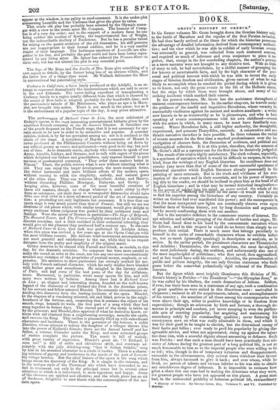The pereeneance of Richard Coeur de Lion, the most celebrated
of Gretry's operas, is the most interesting entertainment hitherto given by the excellent French company as the St. James's Theatre. It furnishes one of the proofs frequent on the French stage, that it is not necessary for ope- ratic music to be new in order to be attractive and popular. A contrary opinion, indeed, is by far too prevalent among us; nor is it confined to the music of the stage. A symphony of Haydn or a concerto of Mozart is never produced at the Philharmonic Concerts without being set down by our critical gentry as rococo and antiquated—very good in its day, but now out of date. As to dramatic music, anybody who ventures to speak of our Arnes, Arnolds, Linleys, and Storaces, and to talk with regret of the pieces which delighted our fathers and grandfathers, only exposes himself to pert sarcasm or goodnatured contempt. " They order these matters better in France." There, the public receive what is new without rejecting what is old. They can enjoy the larger development, the more complex forms, the richer harmonies and more brilliant effects of the modern opera, without ceasing to relish the simplicity, melody, and natural grace
of the olden time. They can welcome Meyerbeer, Auber, and Halevy, without discarding Philidor, Monsigny, Dalayrae, and Gretry. In
keeping alive, however, some of the most beautiful creations of those old masters, though no change whatever is made either in their form or substance, yet their dress is aecompusera idemseties -Would ha've matu they raved ni a more advanced period of the art of instrumenta- tion; a proceeding not only legitimate but necessary. It is true that our opera stage is very much poorer than that of France; but still we are not destitute of old pieces which, with similar treatment, would give delight to every audience whose judgment was guided by their unbiassed taste and feelings. Were the operas of Storace in particular—The Siege of Belgrade, The Haunted Tower, and The Pirates—slightly retouched by a skilful and discreet musician, and a little enriched in their orchestral colouring, they would give all the pleasure they produced half a century ago. In the case of Richard Coeur de Lion, that task was performed by Adolphe Adam, when this piece was revived a few years ago at the Opera Comique with the most brilliant success. His delicate wind-instrument accompaniments are most graceful and satisfactory to the ear, while they in no respect derogate from the purity and simplicity of the original music. Gretry deserves to be classed with Purcell and Gluck, as models, to this day, for the dramatic musician. No composer has been more careful to make the sound an echo to the sense, nor has any one more conscientiously avoided any violation of the proprieties of poetical accent, emphasis, or ex- pression. His attention to these particulars has strongly marked his me- lody with French national character, which his early studies have blended with Italian grace and smoothness. He mingled in the literary circles of Paris, and had some of the best poets of the day for collabora- teurs. Marmontel, in particular, wrote many operas for him, and still more were written by Sedaine. Among these last is Richard Coeur de Lion ; an elegant and interesting drama, founded on the well-known legend of the discovery of our Richard the First in the Austrian prison, by his servant and fellow minstrel Blonde'. The romantic circumstances at- tending this discovery form the leading incidents of the opera. Blonde), in the disguise of a wandering minstrel, old and blind, arrives in the neigh- bourhood of the fortress, and, suspecting that it contains the object of his search, sings, beneath its walls, the first part of a song which they had sung together in former days. The second part of the strain is taken up by the prisoner; and Blonde), thus apprised of what he desired to know, re- turns with aid obtained from a neighbouring sovereign, assaults the castle, and rescues the King. This outline is pleasantly filled up with subordinate characters and incidents. There is the governor of the fortress, a noble libertine, whose attempt to seduce the daughter of a villager throws him into the power of Richard's friends; there are the damsel herself and her father, a veteran Crusader under the King; and some animated groups of rustics complete the picture. The music is full of melody, with great variety of expression. Blenders great air, "O Richard, 0 mon roi!" is full of noble and chivalrous spirit, and contrasts ad- mirably with the jolly drinking-song, " Que le Sultan Saladin," sung by him in his assumed character to a circle of rustics. There is a charm- ing mixture of gayety and tenderness in the music of the part of Laurette the village heroine. But the chief feature of the opera is the song which brings about the discovery of the King. It is simple in the extreme, and in the antique style of the Provencal airs which have descended to us; but its treatment, not only in the principal scene but in several other situations in which it is introduced, is most ingenious and happy. Some of the choruses are spirited and effective; and the whole piece has an air of freshness, delightful to ears biases with the commonplaces of the mo- dern opera.


























 Previous page
Previous page